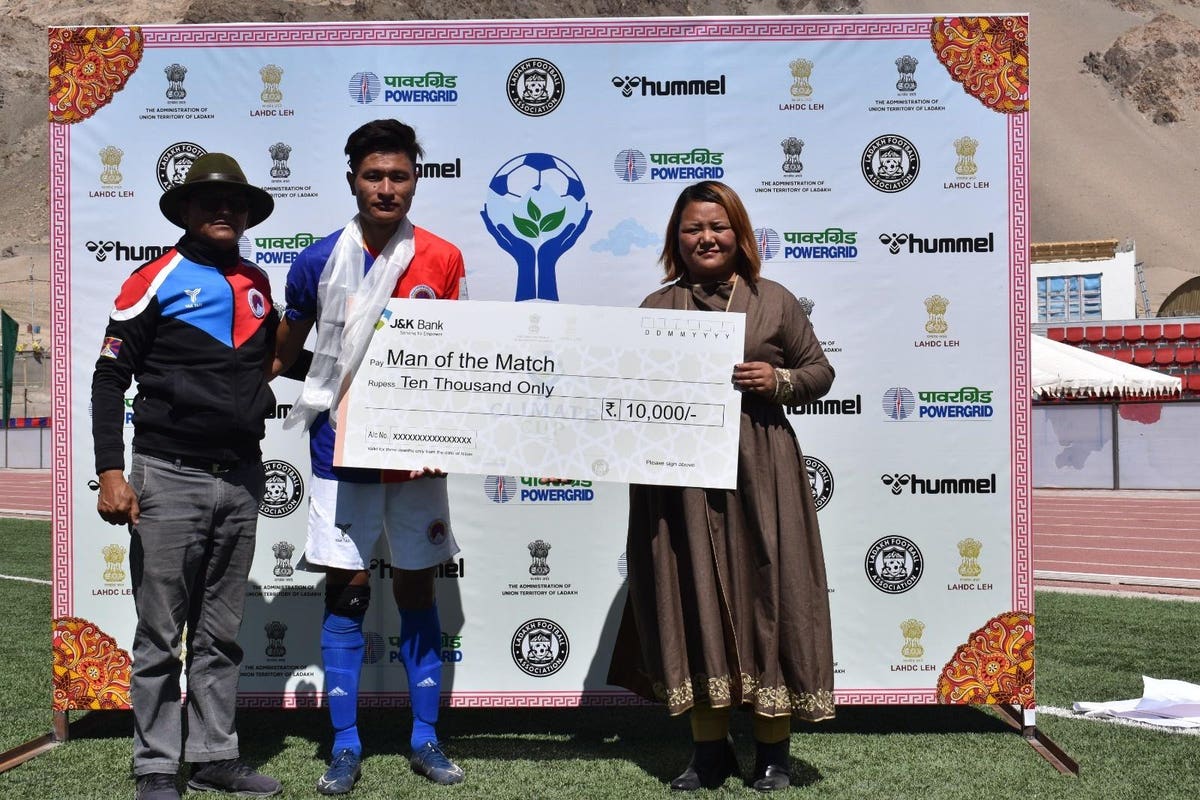Born in the small town of Saboo, near Leh, the capital of Ladakh, Tsering Angmo grew up practicing judo but insists she enjoyed soccer. He remembers his formative years filled with young people playing football on every street of Although most of India prefers cricket, he says Ladakhans like football. However, despite an immense fondness for the sport, the Union Territory (ruled by the administration of Jammu and Kashmir when it grew up) presented few opportunities for football fans. .
Angmo also points out that life was easier back then. Although the small town in the Himalayan region was peaceful, it is a popular tourist destination. She says she didn’t forget about plastic, clutter or packaged food in Ladakh until about 2005. Since then, globalization, tourism and marketing have begun to infiltrate the Himalayan region, bringing with it an increase in the income of the inhabitants, but also of pollution.
Angmo left Leh for Delhi after completing the tenth standard, the equivalent of the second year of the best school in the United States. There he began the Chinese martial art Wushu, competing worldwide for India. However, the moment of the sliding door for Angmo came here when he had the possibility to move on to Europe. In Marseille, Angmo’s fondness for football awoke. He joined a local football club and contributed to football operations. Angmo says his time there was a transformative learning experience.
He returned to Ladakh in 2014 and discovered the same enthusiasm for football on the streets of the cities. But under the administration of Jammu and Kashmir, there were few avenues of progression for young players. After Ladakh gained autonomy and became a Union Territory (UT) in 2019, Angmo saw the Ladakh Football Association (LFA) open up and discovered. She is now General Secretary of the LFA, the only woman in all of India to hold that position in one of the country’s regional football associations.
Secretary General Angmo does not take her position lightly. It intends to expand football in the region and provide opportunities for children and (especially) women to thrive. She hopes that by incorporating the first woman on the board of directors of the Indian Football Association (AIFF), she is already paving the way for women and women to care more about football.
The Secretary General is working hand in hand with the UT government and the Ladakh Hills Autonomous Development Council, Leh (LAHDC Leh) to offer football programmes to locals and local sports infrastructure. She says those responsibilities would have been “impossible without their support. “”Angmo also combines his role within the LFA with his position as director of the new 1 Ladakh FC.
1 Ladakh FC is UT’s first professional football club. It is only five months old, but it is already making its way into the community. The club was created with two goals in mind: 1. Provide a career outlet for players, 2. To be a vehicle for social and environmental defense. To that end, Angmo was instrumental in helping the new club host the 2023 Climate Cup, the first climate-focused football tournament to be held at more than 11,000 feet.
General Secretary Angmo is involved in environmental upheavals in Ladakh. Living in a domain above 11,000 feet, glaciers and melting ice are the lifeblood of the community. Melting snow from the Himalayan peaks provides crystal clear drinking water to locals, while glaciers, snow and wind provide ideal weather for snow leopards as well as nomadic sheep herders who turn the fur of their flocks into much-needed cashmere. But Angmo says the snow that was once common in Ladakh is disappearing.
Huge adjustments in weather patterns – due to emerging global greenhouse fuel emissions – have led to flooding and increased rainfall. The arid mountainous landscape adapts less and less to the nomadic practices and classic lifestyle of the region. But Angmo says tourism in the domain continues to grow. As she continues to welcome others to her homeland, Secretary Angmo needs locals and visitors to take note of the major environmental adjustments underway. She says, “We need all citizens to feel guilty and protect our homeland. “That’s why it was so vital for Angmo and his fellow administrators of 1 Ladakh FC and LFA to help the Ladakh government host the 2023 Climate Cup in Leh.
A view of the football stadium in Leh, Ladakh, with the barren mountain in the background.
Angmo admits that hosting the tournament posed challenges. He points to the lack of (sports) infrastructure in the region and the fact that primaries in the region are quite infrequent as two of the main obstacles. However, the biggest concentration of the tournament galvanized both locals and visitors. The organizers brought groups of visitors from Tibet and Delhi, thus gaining from neighboring regions. The final match between Delhi FC and the Tibetan NSA was attended by AIFF President, Indian football legend Bhaichung Bhutia, as well as members of some of the forty-five regional football clubs. Angmo says it was vital to come with the Tibetan NSA because they have a similar culture and also constitute a Himalayan community. He says that in the future, the region hopes to host a larger Climate Cup, but that will have to wait until infrastructure improves.
Since the Climate Cup ended a week ago (on September 7), Secretary General Angmo is thinking about the long term. He admits that the long term of Ladakh is going to be difficult, especially due to water scarcity, and emphasizes that other people want to focus on glaciers because Ladakh is in danger. Still, Angmo intends to create opportunities for his other friends and raise awareness about the climate through football. He says he “wants to see the women of Ladhaki play in the FIFA Women’s World Cup. “

